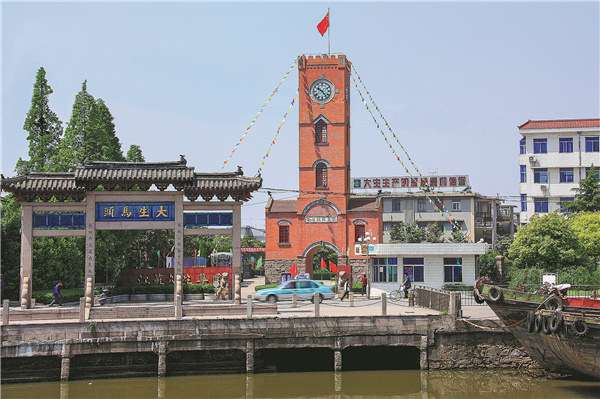A place with a sense of history


Solid foundation
The visionary behind Tangzha's transformation was Zhang Jian (1853-1926), from Nantong, a top scholar of the late Qing Dynasty, who was a leading social reformer, educator and a patriotic industrial entrepreneur in early 20th-century China. Starting in 1895, he established factories, founded schools, built parks and constructed roads, shaping Tangzha into one of the first significant industrial towns in modern Chinese history.
Today, Zhang's vision for the place is presented in a new way, with Tangzha's unique blend of historical charm and contemporary innovation making it a captivating destination for both tourists and businesses.
An old warehouse that stored cottonseed oil a century ago is now an urban memory exhibition hall. A handmade soap factory transformed into a cultural experience center and a former rice milling plant is now a movable type printing experience center. A vegetable market, once a facility for workers, has been converted into a commercial street in the Tangzha Beishi, or northern market, a scenic area that was located north of the ancient town. Since opening in October 2021, the scenic area has attracted over 3 million visitors, according to local authorities.
In 1895, Zhang founded China's first large-scale cotton textile enterprise, the Dasheng Cotton Mills. He didn't stop with the cotton mill. He maximized the use of raw materials at every production stage. Cottonseeds left after ginning were pressed for cottonseed oil and the waste from the oil plant was used to produce soap and candles. He also established oil mills, flour mills, ironworks and breweries. Tangzha soon became a bustling commercial hub, a key transportation center and a booming industrial town in the region, earning Nantong a place as one of the birthplaces of modern Chinese industry.
For over 120 years, the Dasheng Cotton Mills has operated at its original site. The wharf, factory school for workers' training and a man-made river that is a key water resource for fire prevention in the factory still serve their original purposes, making the mill a living museum of Chinese industrial history.
"As the new generation of 'Dasheng people', we aim to carry forward Zhang Jian's entrepreneurial spirit," says Qi Yingbin, chairman of Jiangsu Dasheng Group. The company has preserved the factory's historical look while embracing modern trends in the textile industry. The newly built smart spinning factory has significantly boosted production efficiency.
In 2022, the Dasheng group launched China's first smart spinning factory during the 14th Five-Year Plan period (2021-25), requiring fewer than 10 workers per 10,000 spindles. This factory was recognized by the Ministry of Industry and Information Technology as a model smart manufacturing facility. Currently, the factory employs over 7,000 people, Qi says. "Looking ahead, Dasheng group will focus on smart manufacturing, low-carbon development, full industrial chain integration, and promoting Zhang Jian's cultural legacy," he adds.
The historical buildings of the Dasheng Cotton Mills have been carefully preserved. Qi accentuated their commitment to minimal intervention with the principle of "restoring the old as the old".
The goal "is to make it look as if no restoration has been done", Qi says. "For example, the clock tower's original appearance was kept, the corroded stairs replaced and the clock fine-tuned for accuracy. Now, it still chimes on time."
And plans for more detailed protection and launching of industrial heritage sites and expansion of industrial heritage tourism will be realized, Qi adds.
Over 100 years, three things at Dasheng Cotton Mills have remained unchanged — the name given by Zhang Jian, the focus on the textile industry and the factory's original location.

































